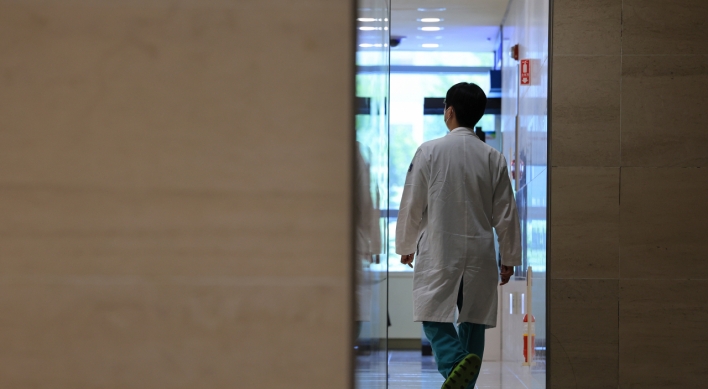[Editorial] Chance to revive exports
Policy change needed to use US-China trade deal in reinvigorating economy
By Korea HeraldPublished : Dec. 15, 2019 - 17:12
It is welcome news that the United States and China have reached their phase one trade accord.
The US agreed to reduce import tariffs on Chinese products worth $360 billion. China agreed to import $50 billion of US agricultural products next year and to ease import tariffs on US products. If Washington had imposed tariffs on Chinese goods worth $165 billion from Dec. 15, as it had initially planned, the global economy would have fallen into turmoil.
They made the deal because they were well aware of the growing side effects of their trade war. Discontent was mounting among American farmers, consumers and companies hit by the trade conflict with China. Furthermore, US President Donald Trump may have needed an achievement to woo voters ahead of the presidential election next year. Meanwhile, Chinese President Xi Jinping needs to ease trade conflict with the US to propel the stable growth of his country as China seeks to keep its growth in the 6 percent range.
However, the deal only allows the two sides to take a breather. A trade war can break out again anytime because key points of contention remain unresolved. Washington wants Beijing to scrap the latter’s requirement of technology transfer, protect US intellectual property rights properly and stop subsidizing Chinese companies. The US dissatisfaction at its failure to secure actionable promises from China over these issues heralds rough sailing in future negotiations.
The pact is not the end of the trade war but a truce. Clashes between the US and China are not just a matter of trade deficits but a matter of ideology and a battle for technological supremacy.
Nevertheless, the deal will give the Korean economy a breather. The US and China account for nearly 40 percent of its exports. The Korean government must use the US-China trade accord as an opportunity to reinvigorate the stagnant national economy.
In the short term, the government and companies must try to stop exports from sliding further and turn them around. Exports decreased every month for a year from December last year to November.
It must also brace itself for the possibility of the US shifting its trade pressure to other countries. Trump has hinted at expanding the trade war, and Korea is no exception from his offensive.
China will likely escalate the pressure, too. If it increases imports of US goods sharply from next year to reduce its trade surplus with the US, Korea’s exports to China will likely take a hit. Beijing will also keep accelerating efforts to catch up with Korea in the semiconductor industry -- which leads Korea’s exports -- and to widen the gap further in artificial intelligence and other emerging fields of the “fourth industrial revolution.”
The Woori Finance Research Institute predicted in a report last week that phase two negotiations may extend over a long period of time and expressed concerns the Korean economy may suffer due to the protracted negotiations.
Therefore, in the medium and long term, Korea must try to reduce its dependence on the US and Chinese markets, diversify its export markets and raise its product competitiveness, among other goals.
More importantly, the government must try to strengthen its economic fundamentals. For instance, policies blamed for serious economic side effects must be changed. Unless this happens, the Korean economy will be shaken easily by changes in external conditions.
On Thursday, a presidential committee on policy planning released a report forecasting Korea’s per capita gross domestic product will rise to $70,000 by 2045 if the policies of the Moon Jae-in administration are maintained and a “peace economy” between South and North Korea materializes.
It presented a rosy future, without mentioning specific plans, even though Korea expects its growth to fall in the 1 percent range this year. Such wishful thinking does not help the fundamentals of the Korean economy.
The US-China trade deal is a much-awaited opportunity to revive exports. The government should make the best of it by changing its policies.
The US agreed to reduce import tariffs on Chinese products worth $360 billion. China agreed to import $50 billion of US agricultural products next year and to ease import tariffs on US products. If Washington had imposed tariffs on Chinese goods worth $165 billion from Dec. 15, as it had initially planned, the global economy would have fallen into turmoil.
They made the deal because they were well aware of the growing side effects of their trade war. Discontent was mounting among American farmers, consumers and companies hit by the trade conflict with China. Furthermore, US President Donald Trump may have needed an achievement to woo voters ahead of the presidential election next year. Meanwhile, Chinese President Xi Jinping needs to ease trade conflict with the US to propel the stable growth of his country as China seeks to keep its growth in the 6 percent range.
However, the deal only allows the two sides to take a breather. A trade war can break out again anytime because key points of contention remain unresolved. Washington wants Beijing to scrap the latter’s requirement of technology transfer, protect US intellectual property rights properly and stop subsidizing Chinese companies. The US dissatisfaction at its failure to secure actionable promises from China over these issues heralds rough sailing in future negotiations.
The pact is not the end of the trade war but a truce. Clashes between the US and China are not just a matter of trade deficits but a matter of ideology and a battle for technological supremacy.
Nevertheless, the deal will give the Korean economy a breather. The US and China account for nearly 40 percent of its exports. The Korean government must use the US-China trade accord as an opportunity to reinvigorate the stagnant national economy.
In the short term, the government and companies must try to stop exports from sliding further and turn them around. Exports decreased every month for a year from December last year to November.
It must also brace itself for the possibility of the US shifting its trade pressure to other countries. Trump has hinted at expanding the trade war, and Korea is no exception from his offensive.
China will likely escalate the pressure, too. If it increases imports of US goods sharply from next year to reduce its trade surplus with the US, Korea’s exports to China will likely take a hit. Beijing will also keep accelerating efforts to catch up with Korea in the semiconductor industry -- which leads Korea’s exports -- and to widen the gap further in artificial intelligence and other emerging fields of the “fourth industrial revolution.”
The Woori Finance Research Institute predicted in a report last week that phase two negotiations may extend over a long period of time and expressed concerns the Korean economy may suffer due to the protracted negotiations.
Therefore, in the medium and long term, Korea must try to reduce its dependence on the US and Chinese markets, diversify its export markets and raise its product competitiveness, among other goals.
More importantly, the government must try to strengthen its economic fundamentals. For instance, policies blamed for serious economic side effects must be changed. Unless this happens, the Korean economy will be shaken easily by changes in external conditions.
On Thursday, a presidential committee on policy planning released a report forecasting Korea’s per capita gross domestic product will rise to $70,000 by 2045 if the policies of the Moon Jae-in administration are maintained and a “peace economy” between South and North Korea materializes.
It presented a rosy future, without mentioning specific plans, even though Korea expects its growth to fall in the 1 percent range this year. Such wishful thinking does not help the fundamentals of the Korean economy.
The US-China trade deal is a much-awaited opportunity to revive exports. The government should make the best of it by changing its policies.
-
Articles by Korea Herald








![[Kim Seong-kon] Democracy and the future of South Korea](http://res.heraldm.com/phpwas/restmb_idxmake.php?idx=644&simg=/content/image/2024/04/16/20240416050802_0.jpg&u=)










![[Today’s K-pop] Zico drops snippet of collaboration with Jennie](http://res.heraldm.com/phpwas/restmb_idxmake.php?idx=642&simg=/content/image/2024/04/18/20240418050702_0.jpg&u=)